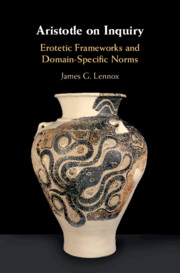Book contents
- Aristotle on Inquiry
- Aristotle on Inquiry
- Copyright page
- Dedication
- Contents
- Figures
- Preface
- Abbreviations
- Introduction
- Part I Erotetic Frameworks and Domain-Specific Norms
- Chapter 1 The Goal of Knowledge and Norms of Inquiry
- Chapter 2 An Erotetic Framework
- Chapter 3 A Discourse on μέθοδος
- Chapter 4 Natural Science
- Part II Norms of Natural Inquiry
- Bibliography
- Index Locorum
- General Index
Chapter 3 - A Discourse on μέθοδος
from Part I - Erotetic Frameworks and Domain-Specific Norms
Published online by Cambridge University Press: 07 May 2021
- Aristotle on Inquiry
- Aristotle on Inquiry
- Copyright page
- Dedication
- Contents
- Figures
- Preface
- Abbreviations
- Introduction
- Part I Erotetic Frameworks and Domain-Specific Norms
- Chapter 1 The Goal of Knowledge and Norms of Inquiry
- Chapter 2 An Erotetic Framework
- Chapter 3 A Discourse on μέθοδος
- Chapter 4 Natural Science
- Part II Norms of Natural Inquiry
- Bibliography
- Index Locorum
- General Index
Summary
Chapter Summary. Aristotle uses the word μέθοδος in a variety of crucial passages in the works that constitute his studies of nature, and in two distinct, yet overlapping, ways: it can refer to the norms of research appropriate to a domain-specific investigation, and it can refer to such an investigation carried out according to such domain-specific norms. It thus forms a conceptual bridge between the domain-neutral norms of APo. ii discussed in the previous chapter and the domain-specific norms that will be discussed in the remaining chapters. In this chapter, I investigate the uses of this concept in Aristotle’s writings on nature. By comparing them with his use of the term in other fields, and the uses of ὁδός and μέθοδος in Plato and in the Hippocratic On Ancient Medicine, it emerges that Aristotle has rich and sophisticated views about ‘proper ways of proceeding’ in an investigation.
Information
- Type
- Chapter
- Information
- Aristotle on InquiryErotetic Frameworks and Domain-Specific Norms, pp. 65 - 98Publisher: Cambridge University PressPrint publication year: 2021
